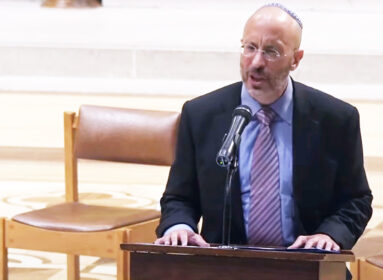By Cindy Mindell ~
WEST HARTFORD — In 1906, a young man working for a cigarette factory on the Lower East Side of Manhattan was trampled to death by a horse while making a delivery in Harlem. A member of the Greek-speaking Yanniote Jewish immigrant community in Manhattan, the man was refused interment by Ashkenazi and Sephardi burial societies, until the Sephardic Brotherhood finally acquiesced.
That year, the United Brotherhood Good Hope Society of Janina burial society was born, the first communal organization of the Yanniote Jews that is still active today. It would be followed, 21 years, by the establishment of Kehila Kedosha Janina (KKJ), a Yanniote synagogue on Broome Street on the Lower East Side that is still active, both as a Jewish house of worship and as a museum.
Museum director and scholar Marcia Haddad Ikonomopoulos will present “Greek Jews on the Lower East Side” on Sunday, Mar. 11 at the Emanuel Synagogue in West Hartford. The event is co-sponsored by Emanuel and the Jewish Historical Society of Greater Hartford.
An educator, translator, and prolific author, Ikonomopoulos is president of the Association of Friends of Greek Jewry, a not-for-profit organization that raises funds for restoration of Jewish sites in Greece and works to strengthen Greek Jewish roots in the Diaspora. As a scholar, she has provided materials, translations, and lectures on the Holocaust in Greece to the U.S. Holocaust Memorial Museum, and has worked with YIVO on its Salonika archives.
By the early 20th century, some 100,000 Jews lived in Greece. Between 1913 and 1931, approximately one-quarter of the Jewish population would emigrate, most relocating to France and the U.S. In addition to economic hardship, says Ikonomopoulos, Greek Jews chose to leave their homeland because of political uncertainty and, in the case of Thessaloniki, a devastating fire and a rise in “economic antisemitism” due to an influx of refugees from Asia Minor.
Half of the 4,000-member Jewish community of Ioannina in northwestern Greece and its sister towns of Arta and Preveza came to New York during this period. Scholars refer to these Jews as Romaniotes, referring to their arrival in Greece during the Roman Empire. It is thought that, after the destruction of the Second Temple in Jerusalem, a slave ship carrying Jews to Rome was caught in a storm and forced to land in Greece.
These immigrants called themselves “Yanniotes” – Jews from Ioannina – a name still used today. Distinct in language and religious practice from both Ashkenazi and Sephardic synagogues, the Yanniotes established their own institutions and organizations, perpetuating their culture, traditions and religious observance.
“The Sephardic Jews in New York initially looked down on the Romaniotes, calling them ‘Grecos,’ a derogatory term,” Ikonomopoulos says. “But, ironically, as many Sephardic synagogues closed as members moved away from the neighborhood, the remaining congregants came to worship at KKJ, feeling more comfortable in our synagogue than in an Ashkenazi one.
As Yanniotes moved from the Lower East Side to the outer boroughs, they would establish new synagogues, including Shearith Israel of Janina in the Bronx and Kehila Kedosha Janina of Mapleton in Brooklyn, both now defunct. Kehila Kedosha Janina on the Lower East Side is the sole Yanniote synagogue still in operation. The only synagogue of its kind in the Western Hemisphere, the building was designated as a landmark by the City of New York in 2004.
“Greek Jews on the Lower East Side” with Marcia Haddad Ikonomopoulos, Sunday, Mar. 11, 7 p.m., The Emanuel Synagogue, 160 Mohegan Drive, West Hartford. Cost includes Greek dessert reception: $15/Jewish Historical Society of Greater Hartford member; $18/non-member. For information or to RSVP contact (860) 727-6170 or www.jhsgh.org.







 Southern New England Jewish Ledger
Southern New England Jewish Ledger















